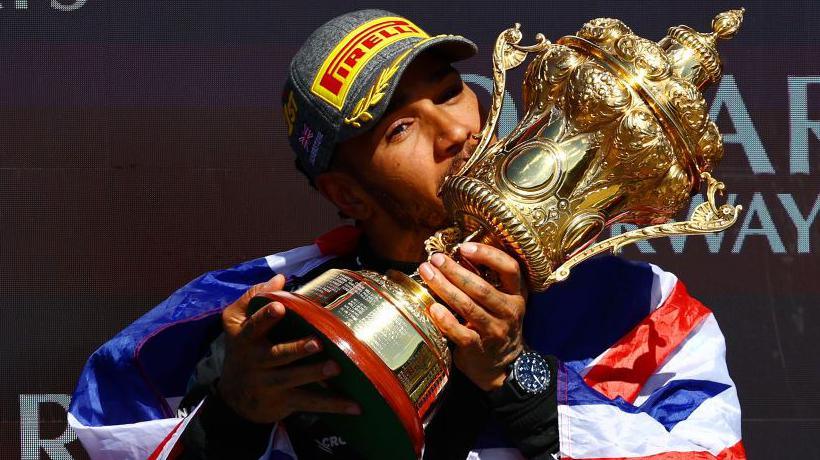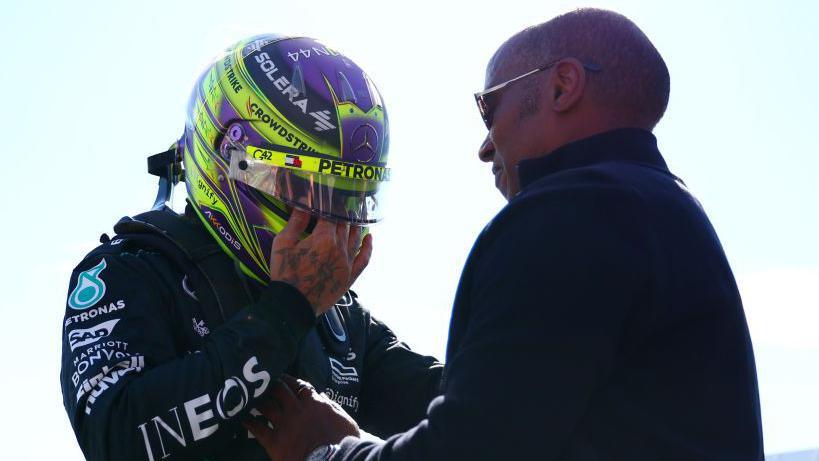I thought it was never going to happen again - Hamilton

Hamilton has won a record nine times at Silverstone, and has a straight named after him
- Published
Lewis Hamilton has had to wait for it, but he finally had his moment of redemption at the British Grand Prix and returned to the top step of a Formula 1 podium - two years, seven months and two days since he last stood there.
In doing so, he broke the record for wins at a single track, and did it in front of his home crowd and his family.
“I can’t stop crying,” he said straight after climbing out of his car. Later, he said: “That might be the most emotional ending to a race I think I have probably ever had.”
To understand those tears, you have to consider what Hamilton has been through in that period.
His last victory was at the 2021 Saudi Arabian Grand Prix, as his fierce title fight with Red Bull’s Max Verstappen came to a dramatic climax.
A week later, in Abu Dhabi, Hamilton lost the chance to win a record eighth championship after the then race director, Michael Masi, made up the rules as he went along in a late safety-car period.
Over the winter that followed, Hamilton thought about walking away from the sport. Instead, he came back determined to right what he perceived as a wrong, a title that he felt was robbed from him. Only to find that his Mercedes team - after eight consecutive world constructors’ titles - had lost their way following the introduction of new rules.
In the 945 days between his last win and this one, Hamilton said on Sunday, he had doubted himself; doubted, too, whether another victory would ever come.
“The adversity we have gone through as a team and I have personally experienced,” he said, "the constant challenge, like we all have, to get out of bed every day and give it your best shot.
“So many times when you feel like your best shot is not good enough, and the disappointment sometimes you can feel.
“We live in a time when mental health is such a serious issue and I am not going to lie (and deny) that I have experienced that.
“There have definitely been moments between 2021 and here when I didn’t feel like I was good enough, or I thought it was never going to happen again. I have never cried coming from a win. It just came out of me. It is a really great feeling and I am really grateful for it.”
Over the past two years, with a few exceptions, he has generally avoided talking about Abu Dhabi and its impact on him. But this time he let it out.
“Honestly, when I came back in 2022, I thought that I was over it,” Hamilton said. “And I know I wasn’t, and it's taken a long time to heal that kind of feeling. That's only natural for anyone that has that experience. I've just been continuing to try and work on myself and find that inner peace day by day.”
The emotions at Silverstone were so intense because so many aspects of his life journey had come together at once. Not just the end of a long, long win drought. But his home grand prix, in front of a crowd that adores him and cheered his every move, even when he was fighting with another Briton, Lando Norris. On a track that he said he considered the “best in the world”.
On top of that, he is in his last season with Mercedes, who have backed him since he was 13, before he moves to Ferrari next season; his desire to end his career with them on a high.
And an appreciation of time passing, and of valuable personal moments spent with the people he loves most in the world - his father, mother, brother, sister and her children were all at Silverstone with him.
“Your parents are getting older, you know. We're travelling so much,” Hamilton said. “Time with family is a constant challenge. My niece and nephew are growing up and growing out of their cuteness. But I've had them here this weekend.
“We all try to be there for each other, even at a distance. I know I've always had their support, but to be able to see them there and share this experience, they wanted to be at my last race, the last British Grand Prix with this team that have been so incredible to us.
“Mercedes obviously supported me since I was 13. So it's definitely meant the most today to have them there and to be able to share it with them.”
- Published7 July 2024
- Published6 December 2024
‘And then it clicked’ - how Mercedes have bounced back
Hamilton triumphed in a race that ebbed and flowed, from a dry start, through two periods of wet weather into a dry finish, and in which the winner was in doubt until the very end.
Hamilton had qualified second to team-mate George Russell and they ran that way through the early laps.
The McLarens of Norris and Oscar Piastri came to the fore in the wet middle period, only to fumble their pit strategy, and hand the win to Hamilton at the final pit stops, when Verstappen also came back into the frame after an unusually uncompetitive race for him was turned by Red Bull’s final tyre choice.
Verstappen charged by Norris to take second, and then chased down Hamilton, who held on to win by just over a second.
In the dry early phase, the Mercedes were clearly the fastest cars on track, and Hamilton managed his soft tyres in the closing laps expertly, while Norris’ fell off badly.
It was confirmation that Mercedes really are finally back in the battle at the front after a long, trying period.
It has happened so quickly. As Mercedes team principal Toto Wolff put it: “Five races ago, we weren’t contenders for the podium and it looked like we were in the third year of non-performance, and then it clicked.”
The “click” moment, Wolff said, was largely down to the input of James Allison, who was reinstalled as Mercedes technical director in the spring of last year when Mercedes realised they had messed up their car for the second year in succession.
“There was a moment where, led by James, suddenly the data made sense,” Wolff said. "The way we made it, the way we balanced the car. And how we could bring it in a better sweet spot. That was the main thing. It wasn’t a miracle front wing, it was more the balance we achieved.”
For his part, Allison explains the transition as one of culture inside the team.
He says it took Mercedes too long to realise that the rules introduced in 2022 “require a different set of skills and a different way of interacting with each other”.
The various departments that define the design and performance of the car, Allison says, need to work much more closely together than under the previous set of rules, under which Mercedes were so successful.
“The car,” he says, “is just the outcome of the institutional approach to designing a car. Everything about being competitive is about valuing the right things, putting resource onto the right things and then pursuing those right things with vigour. The car just pops out at the end as a consequence of that.”
Having realised what was important in making the car fast, and made the appropriate organisational changes, Mercedes have made remarkable progress.
“Suddenly,” Wolff said, “everything that didn’t make sense, made sense and the results of the development direction is back in the old days.”
They have been on pole at two of the last four races. Russell, who retired at Silverstone with a water leak, won in Austria a week ago, inheriting the lead when Verstappen and Norris collided and damaged their cars.
At Silverstone, the Mercedes qualified one-two and were the fastest cars in the race, except when the track was wet, and even then the swing in performance was down to McLaren running more downforce.
Hamilton said: “There's still a long, long way to go, but we are super close, and I think hopefully with the next upgrade perhaps, we will be in an even stronger position to really, really be fighting for the front row more consistently.”
The next upgrade will come at the next race in Hungary, another of Hamilton’s favourite tracks, with another to follow in Belgium a week later.
“We are finding performance and we are putting it on the car,” Wolff said. “And it translates into lap time and that wasn’t the case for the last two years.
“There is more to come in terms of performance. We are bringing updates to Budapest and Spa but on the other side we mustn’t get carried away. We had a win last week benefiting from (Verstappen and Norris) tangling but today we have an honest win.
“We had the real pace. You could see George and Lewis in the lead and almost under all conditions we were there.”

Hamilton, pictured here with father Anthony, was emotional following his win
Norris down on himself
Hamilton, Norris and the other leading drivers at Silverstone put on arguably the best race so far of a year that has completely shifted from the Red Bull domination of the first five races. In the end, Verstappen split Hamilton and Norris, but it could easily have been a British one-two, and either way around.
Norris was leading going into the final pit stops, but the decision to stop for the final time a lap later than Hamilton and Verstappen, in addition to a delay caused by Norris stopping slightly long of his marks, put Hamilton in front. When the McLaren chewed through its soft tyres faster than the Mercedes, Verstappen was able to close in and take second.
For McLaren and Norris, it was another “missed opportunity”, as team principal Andrea Stella put it, to add to others in Canada, Spain and Austria.
Norris was very down on himself afterwards.
“We threw it away at the final stop,” Norris said. “Even if we had boxed on the perfect lap, the decision to go on the softs was the wrong one. Lewis would still have won, so two calls from our side cost us.
Stella said the team took responsibility for the pit calls. But Norris, at least after the race, was looking at himself.
“I didn’t do a good enough job today with the calls,” he said, “So many things are good and in place, just not executing things the way I want and need to.
“When you throw away a win, it is pretty disappointing. I am just not to the level I need to be at, not to the level of the others at the minute. It is something I need to work on.”
Formula 1: McLaren’s Lando Norris explains what he loves about the British Grand Prix